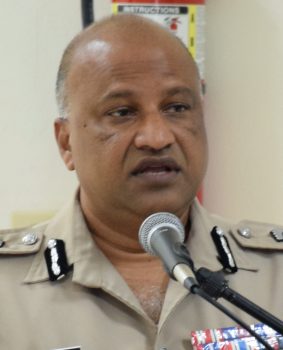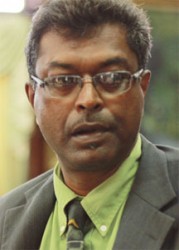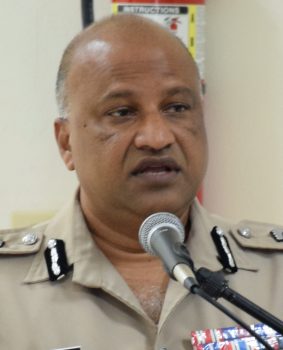Noting that Public Security Minister Khemraj Ramjattan has no authority to direct Police Commissioner Seelall Persaud to proceed on “special leave,” former attorney general Anil Nandlall said yesterday that what has occurred is a clear violation of the Constitution.
Nandlall said too that based on the wording of the letter to Persaud containing the directive, he has been suspended from office.
“What we are witnessing here… is a complete disregard for the constitutional process which must be undertaken as prescribed by the Constitution, if a Commissioner of Police is to be lawfully suspended. The entire regime of security of tenure that the Constitution has accorded to the Office of the Commissioner of Police is being ignored, eroded and trampled upon by the political diktat of a minister, who seems to be taking instructions from a phantom,” Nandlall said, while calling the situation the latest example of government’s disregard for the Constitution.

On Friday, the day he was due to return to work after four months of vacation leave, Persaud was given a directive to proceed on indefinite “special leave” in the public interest. Though the letter said differently, Ramjattan, who issued the directive clarified to this newspaper that Persaud would be proceeding on 56 days of annual and pre-retirement leave, after which he will return to office. He is to return to work on January 22, 2018.
Speaking to Sunday Stabroek last evening, Nandlall explained that Section 6 of the Police Act Chapter vests in the Commissioner of Police “the command, superintendence, efficient administration and government” of the Guyana Police Force and “for the proper expenditure for all public monies appropriated for the service thereof.”
He said that the Minister of Public Security has no authority over the force or the Commissioner of Police other than a general power to give “policy directions.” “This is not a matter of conjecture but a matter of law and based upon the clear language of Section 6 of the Police Act, which has been the subject of interpretation by our courts on a number of occasions,” he said, while noting that it is equally clear that the Police Service Commission exercises no disciplinary control over the Commissioner of Police.
According to Nandlall, the Commissioner of Police enjoys a “strong regime of security of tenure under the Constitution,” similar to that of other important constitutional office holders, such as High Court Judges.

Article 225 of the Constitution, he reminded, states that the holder of the Office of the Commissioner of Police shall not be removed therefrom or suspended from the exercise of the functions thereof except in accordance with the provisions of the Article. The Article, he said lists only two grounds upon which the Commissioner of Police can be removed from Office—inability to perform the functions of his office, whether arising from infirmity of body and mind or for misbehaviour. The Article further provides that if the question of removal arises then the President must establish a tribunal, consisting of a Chairman and two other persons, who are judges or former judges or persons qualified to be judges, who shall investigate the question of the Commissioner’s removal from Office. When that tribunal is established, it is only then that the president has the power to suspend the Commissioner from performing the functions of his Office, Nandlall said, while adding that the tribunal shall then report to the president and recommend whether or not the person should be removed from office.
Nandlall told Sunday Stabroek that after applying those provisions of the law and Constitution to the letter sent by Ramjattan to Persaud, “one would quickly see that the letter has contravened the law and manifestly violated the Constitution in several respects.”

“As Vice-President and Minister of Public Security, Mr. Ramjattan has no authority to write such a letter to the Commissioner of Police. Mr. Ramjattan in the letter says that he is ‘advised to inform’ the Commissioner. Advised by whom? Even the president cannot send such a letter. That letter amounts to a suspension of the Commissioner of Police from performing the functions of his office. Such a suspension is clearly prohibited by Article 225,” he stressed.
‘Concoction’
In the letter, Ramjattan informed Persaud that he was being sent on leave “in the public interest and to allow for continuing initiatives and innovations being pursued by the Guyana Police Force’s temporary administration to be completed before your resumption of duty.” (The temporary administration is being led by acting Police Commissioner David Ramnarine, with whom Persaud has had differences.)
In response to this, Nandlall stated that Ramjattan must be ashamed, as a lawyer, to author such “unvarnished ignorance.” “If the framers of the Constitution intended the Police Commissioner to be removed on the ground of this nebulous term ‘public interest,’ they would have said so in the Constitution and they would have defined what ‘public interest’ means. This is simply a concoction of Mr. Ramjattan which he uses to subordinate the Constitution,” he charged.
Nandlall added that any “initiatives and innovations” pursued by the Guyana Police Force must be done either by the Commissioner of Police or those authorised by him. “If they are not, then they would be ultra vires and unlawful. The law does not contemplate the force to have a “temporary administration.” The Commissioner of Police is the head of the administration of the Guyana Police Force. The force is a creature of statute and can only act and be administered and managed in accordance with that statute—the Police Act,” he said.
Nandlall also questioned the use of the term “temporary administration.” “What is this temporary administration? Who appointed them? From where are they getting their authority? This ad hoc body and the tasks that they are undertaking are all unlawful. Has there been coup in the police force against the Commissioner?” he asked.
Turning his attention to another part of the letter, which states, “…it is the considered opinion of the Administration that you should be and you are hereby directed to proceed on effective administrative leave from November 24th 2017, until further notice,” Nandlall stated that he is in disbelief that such a statement emanated from Ramjattan.
“Mr. Seelall Persaud, as the Commissioner of Police, does not hold office at the opinion and pleasure of this Administration. He holds office under the Constitution of Guyana and enjoys security of tenure. He can only be suspended from the performance of those functions in accordance with the Constitution. “Special leave” is another vulgar authoritarian fabrication by Mr. Ramjattan to defeat the Commissioner’s constitutional protection. It is a concept that has no basis in law,” he insisted.
Nandlall reminded that last week Chief Justice (Ag) Roxane George SC ruled that a similar directive authored by Minister Joseph Harmon to the Police Service Commission (PSC) to halt its consideration of a police promotion list was a flagrant violation of the Constitution. “If anyone is in doubt that we are on the road to authoritarianism then this incident should remove those doubts. Firstly, it was Carvil Duncan, Chairman of the PSC. Then it was the Registrar of Deeds. Then the Deputy Solicitor General and the list goes on. Now, it is the Commissioner of Police. Next it might be a judge who rules against them,” Nandlall said.
Ramjattan, in his comments to this newspaper on Friday, had explained that Persaud upon his return in January will remain in office until around May 1, when he is due to retire.
The directive to Persaud comes weeks after the findings of a Commission of Inquiry into an alleged assassination plot against the president were officially made public. It recommended that Persaud be made to resign under terms considered appropriate by President David Granger, or if he fails to do so, be removed for misbehavior. It also recommended that he be investigated for perjury.
The recommendations were made on the grounds that Persaud had interfered in the probe of the alleged assassination plot while he was on vacation leave and influenced the conduct of the investigations; acted improperly by instructing that the brother of the suspect be sent on bail, thereby bypassing the chain of command; failing to recuse himself from the matter although there was a conflict of interest; and failing to review the file on the matter.
Government is yet to publicly state how it plans to deal with the recommendations, which were submitted on August 31.







